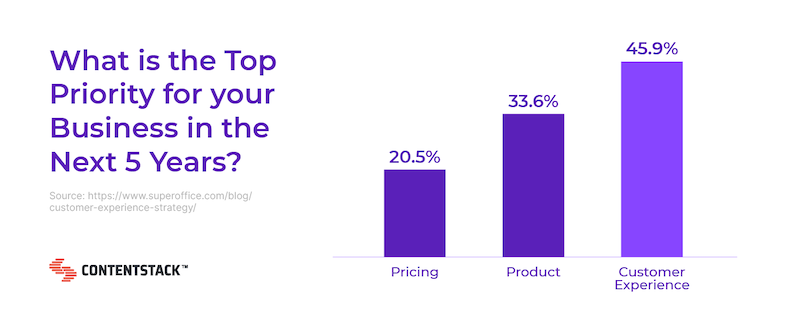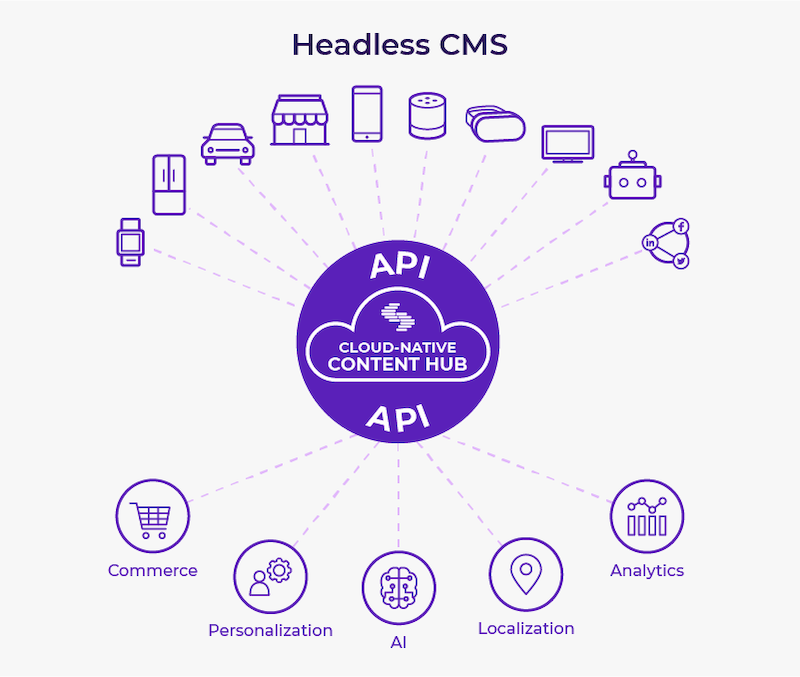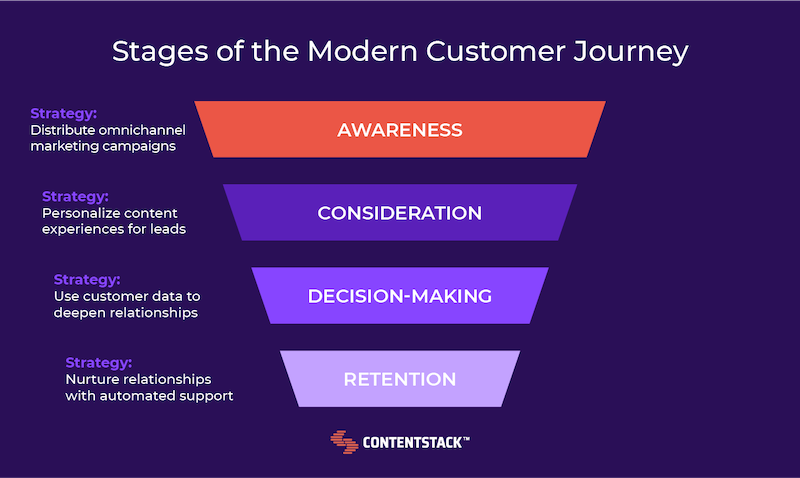Customer loyalty isn't what it used to be. Gone are the days when points programs or even product quality were enough to attract and keep a customer. In a marketplace where all the rules are changing, digital managers have a critical role to play in earning the business of all customers—potential and existing—with a consistent, high-quality customer experience (CX).
And the numbers show that putting effort into CX is well worth it. Accenture predicts that a digital wave is underway that could bring a cumulative $2.95 trillion in value to the retail industry by 2025—all powered by digital connections to consumers. With the right mindset and the right tools, brands have an incredible opportunity to level up their CX approach and earn more market share.
Already, leading companies are getting on board with the experience-driven customer journey. According to the 2020 Digital Marketing Trends Report by Econsultancy and Adobe, customer experience ranked number one as the most exciting business opportunity today. Here’s what customer experience means today and how businesses can ensure that all stages of the customer journey are united by a thread of outstanding CX.
What Does Modern Customer Experience Mean?
The customer experience is the sum of the interactions that a person has with your brand, from their first impression to their most recent contact, including everything you would expect: Convenience, quality, attitude, and more. What the modern customer experience adds to this is that so many of these interactions can now take place digitally. This vastly increases the channels, devices, and platforms upon which customers can interact with your brand, as well as how often. In a digital world where customers have many ways to engage with your brand, there are more opportunities to get CX right—or to get it really, really wrong.
A global CX study by Oracle found that rising customer expectations (59%) and the impact of social media on customers’ ability to broadcast good and bad experiences (37%) are the top two drivers for organizations’ focus on customer experience. Research shows that it costs five times as much to attract a new customer than to keep an existing one. That alone could be reason enough to focus on CX, but there’s even more compelling data to demonstrate why you should invest in CX for all of your customers. Let’s look closer at how important CX really is.
Why is Customer Experience So Important Today?

According to research by Forrester, how an experience makes customers feel has a bigger influence on their brand loyalty than the ease or effectiveness of the experience.
And a survey conducted by PwC makes an incredibly strong case for a laser focus on CX:
- 73% of people point to customer experience as an important factor in their purchasing decisions
- 65% find a positive experience with a brand to be more influential than great advertising
- 42% would pay more for a friendly, welcoming experience
- 32% of customers say they will walk away from a brand they love after just one bad experience
What’s even more compelling? Customers that give companies a high CX score spend 140% more and remain loyal for up to six years. As technology progresses, customers have come to expect a no-fuss, seamless experience that’s optimized for their needs, regardless of where they are in their buying journey. Here’s how to answer their demands.
How to Bring Modern Customer Experiences to the Customer Journey
The entire customer journey—from the moment a customer becomes aware of a need to every decision they make after that—is full of opportunities to deliver exceptional CX that translates into loyalty that you simply can’t buy. Let’s look closer at the foundation of a modern customer journey and find where you can put digital tools to work to improve your CX along the way.
Stage 1: Awareness
The awareness phase is when your potential customer first becomes aware that they want something or have a problem to solve. In this phase, they’re simply looking for information, so that’s what you want to deliver.
The best way to elevate CX in this phase is by providing a seamless experience that allows your prospects to get the information they want, when they want it, and in a context that’s relevant to them at the time. You achieve that by executing an omnichannel strategy that meets your prospects on their terms.
A headless content management system (CMS)—the latest development in a long and rich history of content management—separates content creation from how it’s designed, stored, optimized, and displayed. This means content can be quickly found, re-optimized, and re-published to cater to the right audience, on the right channel, at the right time.

Stage 2: Consideration
The consideration phase is where a prospective customer assesses how interested they are in the experience they’re receiving from your brand. This is where their preferences come into play, and it’s where they do research to evaluate if there’s a better alternative out there. Competing on this playing field is all about personalization — a growing trend that’s been called the “holy grail” of marketing.
Personalization is all about tailoring an experience based on information that has been collected about an individual, and there’s solid data proving that it works:
- According to KPMG, personalization drives loyalty in 18 out of 20 markets
- Research by McKinsey shows that leaders in personalization have increased revenue by up to 15% and improved the efficiency of their marketing spend by up to 30%
- A study by Accenture found that 91% of consumers are more likely to shop with brands who recognize, remember, and provide relevant offers and recommendations
Using advanced tools like augmented analytics, which uses real-time data from the web and social media, you can get to know your audience better and faster. That allows you to deliver personalized content that tips their decision-making in your favor. Together with predictive analytics, which automate the task of assessing customer behavior to determine what they’re likely to do or want next, you can deliver the personalized experience that leads increasingly expect.
Stage 3: Decision-Making
In the decision-making phase, consumers are working out those last few questions before deciding between their top options. For digital managers, the goal is to build a deep relationship and provide value that would be hard for the consumer to leave behind. How can companies do this in an age where there are so many leads to keep up with across so many channels? They can integrate modern customer relationship and customer data platforms that are purpose-built to help win in the decision showdown.
A customer relationship management (CRM) platform like HubSpot CRM, Zendesk, or Intercom helps you keep track of all the interactions a consumer has had across your business. A customer data platform (CDP) like Evergage or Exponea layers consumer data on top of this relationship information so you can create a complete, personalized profile of the lead at hand — enabling you to build a personal, decision-worthy relationship.
Stage 4: Retention
The customer journey doesn’t end once a product is shipped or a service is delivered. Even after a transaction has been completed, CX is as important as ever. A good experience leads to retention, which is the most significant driver of revenue for businesses. After all, the success rate of selling to a new customer is only 5-20% while the success rate of selling to an existing customer is a whopping 60 to 70%!
While there’s no doubt that the retention stage is vital to the customer journey, the question is how can a single team keep up with providing a great customer experience across various channels at all times of the day?
Artificial intelligence-powered chatbots are the always-on and always-informed customer service “agents” that can document requests, answer customer questions, and even provide the resources consumers need to help themselves around the clock. As long as your chatbots are combined with business processes that ensure no important complaints, requests, or conversations fall through the cracks, automation can help you provide a customer experience that keeps them coming back for more.

Where Will the Modern Customer Experience Take You?
Great CX is a long-term goal, but it’s worth an investment right now. Having a modern marketing technology stack powered by a headless content management system will streamline your content delivery, break down information silos, and integrate your MarTech tools—like your customer relationship management platform, chatbots, and more—to provide a seamless thread of excellence and ease throughout the customer journey and beyond.
For more details on how to level up your company’s performance, download our free ebook Going Beyond ROI with Return on Experience and learn why forward-thinking organizations are shifting their thinking from ROI to return on the modern customer experience.
